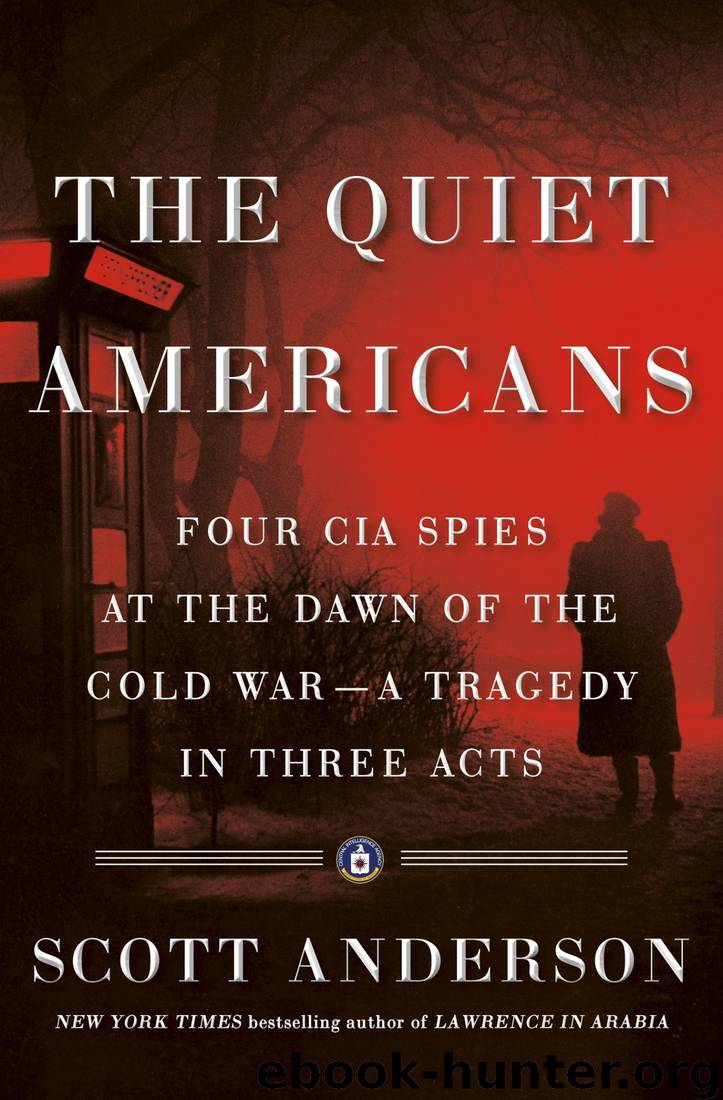The Quiet Americans: Four CIA Spies at the Dawn of the Cold War - a Tragedy in Three Acts by Scott Anderson

Author:Scott Anderson
Language: eng
Format: epub
Publisher: Knopf Doubleday Publishing Group
Published: 2020-09-14T23:00:00+00:00
18
TOSSING THE DICE
Due to the difference in time zones, news of the invasion of South Korea had reached CIA Berlin late on the night of June 24. As with every other intelligence and military unit in the Western world, the news instantly triggered alarm bells, but those bells rang especially loud in Berlin.
“If this was the prelude to something larger,” Peter Sichel explained, “the beginning of a general Soviet offensive, the consensus was that Berlin would almost certainly be next.”
That fear was seemingly well founded. In light of both the scale of the North Korean attack and the advanced Soviet-supplied weaponry employed in carrying it out, it was clear that, at the very least, Stalin had signed off on the invasion, perhaps even ordered it. If there was to be a second target, where else but Berlin, that nettlesome Western outpost in the heart of East Germany that the Soviets had already tried to choke off in the 1948–49 blockade?
No grand offensive came, of course, and once the initial alarm had passed, Sichel found something almost reassuring about life in Berlin in the post-Korea environment. “It might sound strange,” he said, “but at least now there was a kind of clarity. After Korea, there were no more what-ifs, no more thoughts of, ‘oh, maybe we’re judging Russia too harshly, maybe there’s still a way we can come together.’ None of that. Now it was a pure war. Hopefully not a shooting or a nuclear war, but a war nevertheless.”
But a war in which it appeared the United States was doomed to stumble in the dark, forever caught by surprise so long as it stayed on defense and tried to predict what the Soviets might do next. This had everything to do with the nature of their foe—and specifically, with the personality of Joseph Stalin. In the case of the other great belligerent of the twentieth century, Adolf Hitler, there had at least been a method to his madness; in Mein Kampf, Hitler had outlined many of his plans for European conquest and then pursued them. With Stalin, by contrast, there was no blueprint. If there was a discernible pattern at all to his actions it was that he would take whatever path might amass even more power to himself, to grab whatever he thought he could get away with. Even this, though, was hardly a guide. Testament to the vozhd’s ever-changing ambitions and fears and rages were the heaped bodies of most everyone who had once been an intimate. Put simply, Stalin made it up as he went along and, given the homicidal power structure he had forged in the Kremlin, there was no one and nothing to save him from his worst ideas.
Adding to this opaqueness, in 1950 the United States didn’t have a single mole anywhere near the senior Kremlin leadership. It was also five years away from having the sort of advanced spy planes that could reliably chart the vast territory of the Soviet interior for signs of impending trouble, troop buildups or new missile silos.
Download
This site does not store any files on its server. We only index and link to content provided by other sites. Please contact the content providers to delete copyright contents if any and email us, we'll remove relevant links or contents immediately.
| Anthropology | Archaeology |
| Philosophy | Politics & Government |
| Social Sciences | Sociology |
| Women's Studies |
The Secret History by Donna Tartt(18224)
The Social Justice Warrior Handbook by Lisa De Pasquale(11963)
Thirteen Reasons Why by Jay Asher(8472)
This Is How You Lose Her by Junot Diaz(6462)
Weapons of Math Destruction by Cathy O'Neil(5853)
Zero to One by Peter Thiel(5507)
Beartown by Fredrik Backman(5372)
The Myth of the Strong Leader by Archie Brown(5249)
The Fire Next Time by James Baldwin(5032)
How Democracies Die by Steven Levitsky & Daniel Ziblatt(4970)
Promise Me, Dad by Joe Biden(4916)
Stone's Rules by Roger Stone(4872)
100 Deadly Skills by Clint Emerson(4700)
A Higher Loyalty: Truth, Lies, and Leadership by James Comey(4565)
Rise and Kill First by Ronen Bergman(4553)
Secrecy World by Jake Bernstein(4406)
The David Icke Guide to the Global Conspiracy (and how to end it) by David Icke(4393)
The Farm by Tom Rob Smith(4332)
The Doomsday Machine by Daniel Ellsberg(4253)
